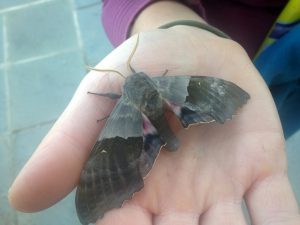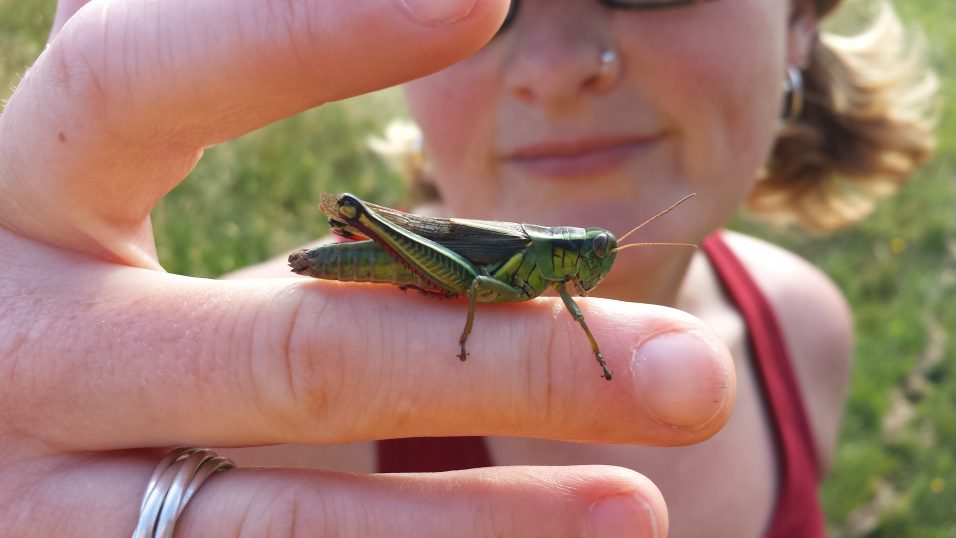What’s Growing at the Harriet Irving Botanical Gardens: Are Humans Smarter than Insects?
By Melanie Priesnitz, Conservation Horticulturist
Working in the garden for the last two decades, I have encountered my fair share of insects. I have also encountered way more people who are afraid of insects than those who love them. Overall, insects tend to get a bad rap and I truly have no idea why. Is it because some of them hurt us or can even kill us? The US National Safety Council statistics tell us that we should be way more afraid of automobiles than insects. They report that the odds of dying from a wasp, hornet, or bee sting are 1 in 71,623, whereas the odds of dying in a car accident are 1 in 303.
The fear of insects is not based in logic. Perhaps humans think that we are better than insects because we are so much bigger. I, however, was taught from a young age that small is beautiful and I truly think it is. I could spend my entire day watching a colony of ants go about their work in the garden if I allowed myself the time. I love what ants represent, how they work together with such cooperation, determination, and self-sacrifice for the greater good. I find myself loath to put out ant traps around my house as I worry about what affect killing a colony will have on the ecosystem that is my garden and home.
 One human who’s on my side is Dr. Jeremy McNeil, biology professor and world-renowned educator from Western University. Jeremy is a fierce advocate for insects through his research and education. He was inspired to begin educating others on the importance of insects through witnessing an event in his own backyard. Over thirty years ago Jeremy excitedly brought a hornworm caterpillar to meet his young neighbour. When he let the child hold the insect, the boy, after investigating it for a moment, squashed it. When asked why he killed the specimen of study, the boy responded that his parents had told him insects are bad. So as to avoid telling young children that their parents are wrong, Jeremy decided to start working on changing attitudes through education.
One human who’s on my side is Dr. Jeremy McNeil, biology professor and world-renowned educator from Western University. Jeremy is a fierce advocate for insects through his research and education. He was inspired to begin educating others on the importance of insects through witnessing an event in his own backyard. Over thirty years ago Jeremy excitedly brought a hornworm caterpillar to meet his young neighbour. When he let the child hold the insect, the boy, after investigating it for a moment, squashed it. When asked why he killed the specimen of study, the boy responded that his parents had told him insects are bad. So as to avoid telling young children that their parents are wrong, Jeremy decided to start working on changing attitudes through education.
Jeremy has been teaching for over forty years, and alongside students and collaborators, has published more than 180 papers in international journals and more than ten book chapters. He has received numerous national and international awards (including the Humboldt Prize), is a Fellow of the Royal Society of Canada, and has been named to the Order of Canada for his work in studying reproductive biology in insects and for his dedication to increasing public appreciation of science. His latest accomplishment of interest is his contribution to a book Let’s Talk Science for Kindergarten to Grade 3 students which will be translated into French, Spanish, and Portuguese, and distributed widely throughout school systems in the Americas.
We are very pleased to be bringing Dr. Jeremy McNeil to Acadia University for a public talk as well as a biology seminar. Join us for the free public talk on Monday October 29 from 7:30pm – 9:00pm in the auditorium at the K.C. Irving Environmental Science Centre at Acadia University. During this lighthearted photographic presentation Jeremy will draw comparisons between humans and insects to highlight some of the common ground that we share, such as paper making and solar panel building. You will leave with a better understanding of the critical role that insects play on earth and will hopefully think twice in the future before squashing the tiny crawling and flying creatures that we share this planet with.
Harriet Irving Botanical Gardens
Acadia University
botanicalgardens.acadiau.ca
